Churches know that there are high-traffic times for people to visit your church: Mother’s Day, Easter and Christmas. The latter is fast-approaching and you can ramp up your church’s social media presence and online presence with 7 easy steps to maximize your communication reach to those who might be interested in coming this time of year:
- Create a Facebook Page for your church – maybe even multiple Pages depending on the size of your church (one is best for consolidation but you might need a specific Page for Youth, for example). Just like you might want to add your visitors to a follow-up letter or phone call list, having people “like” your Page is a easy way for them to opt-in to receiving communication updates from you. If they are in the exploratory stage, they may not yet be ready to darken the doors, but they are definitely checkin’ you out! If they have never heard of your church, this is a way for you to create high-value content that enriches their lives. Don’t just make your Page a shotgun stream of information and self-promotion announcements. Think about your audience and what they might benefit from. If they perceive that you (and the gospel you proclaim) offer help for the helpless, then you just might achieve that “relevancy” that every church says they are. LifeChurch.tv’s Fort Worth campus recently posted something helpful for guys and gals:
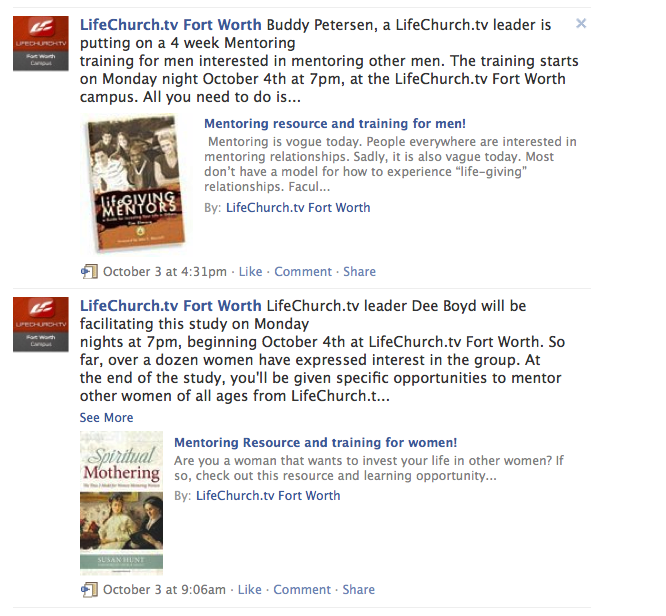 Teach your Fans to tag your Page – Facebook provides a ripe opportunity for passive outreach for your members – with a simple “tag” (using the “@” symbol), they can tag the church’s Facebook Page in their own status that goes out to their hundreds of friends. If you train your members to do this often, it also creates some nice community on the Wall of your church’ s Page – when visitors see your church’s name mentioned in a status, they can easily click on the hyperlinked Page and do some anonymous investigation of their own. Would you rather them see a one-way stream of announcements from the church, OR would you rather your visitors see ALL the various comments made by members? The former communicates information; the latter says this is something people enjoy being a part of! (NOTE: you can remove or delete consistently negative attacks if you are concerned about that happening as you “open yourself up” online). At our church a few weeks ago, we had an inspirational giving weekend and it’s been fun to see some of the “community” going on there on the Page (shared excitement communicates to your visitor that there’s something exciting also beyond the marquee).
Teach your Fans to tag your Page – Facebook provides a ripe opportunity for passive outreach for your members – with a simple “tag” (using the “@” symbol), they can tag the church’s Facebook Page in their own status that goes out to their hundreds of friends. If you train your members to do this often, it also creates some nice community on the Wall of your church’ s Page – when visitors see your church’s name mentioned in a status, they can easily click on the hyperlinked Page and do some anonymous investigation of their own. Would you rather them see a one-way stream of announcements from the church, OR would you rather your visitors see ALL the various comments made by members? The former communicates information; the latter says this is something people enjoy being a part of! (NOTE: you can remove or delete consistently negative attacks if you are concerned about that happening as you “open yourself up” online). At our church a few weeks ago, we had an inspirational giving weekend and it’s been fun to see some of the “community” going on there on the Page (shared excitement communicates to your visitor that there’s something exciting also beyond the marquee). 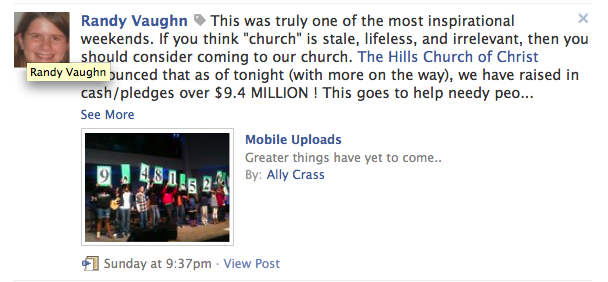
- Make sure your Facebook Page link is readily visible on your website. Prospective visitors are lurking and stalking . . . and investigating churches for what they are looking for. Make it EASY for them to connect with you in an EASY way on this popular social networking site that they are spending time on already! If they come to your site via a Google search, they are looking for information, but putting yourself on Facebook makes it easy to connect with them going forward. Even on the list of “best churches” (via Tim Spivey’s recent blog), I am surprised how many of them leave this link off their main site. Churches put alot of effort into making their website robust and heavy on information. But, prospective visitors aren’t necessarily in the mood to scour through all the pages on your site at that time. They are ready to move on – and if you haven’t strategically moved them into some form of “opt-in”, you may never know how to follow up or with whom to follow-up. Moving them to “like” your Facebook Page is a super easy way to maintain communication with them. Also put direct links to your Facebook page on your emails (on individual staff email signatures and in your church’s communication messages).
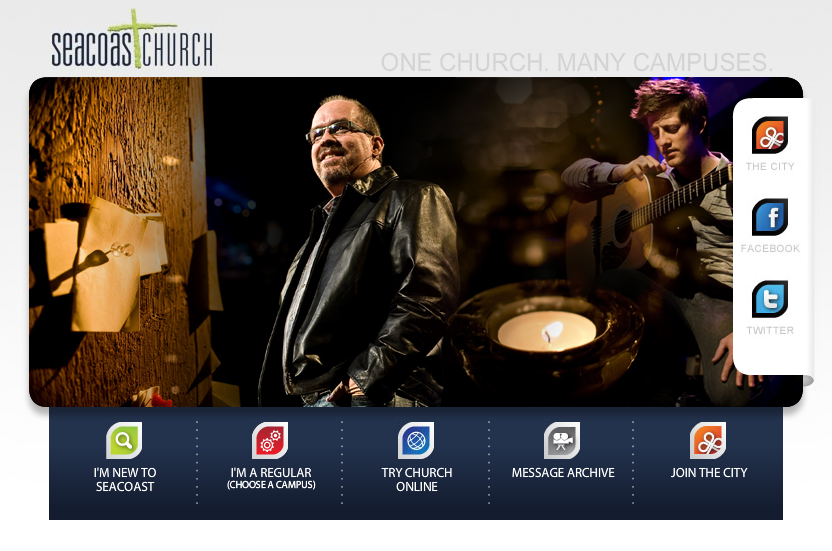
- Greet your new fans with a warm “Welcome” – Why not create a customized “Welcome” landing tab (like we recently did for the Western Hills Church in Temple, TX) that greets all your visitors! Just as most churches station friendly members at the entrances of your building, a customized landing tab offers a friendly greeting to Facebook visitors. You’ll have the opportunity to point your new fans into the direction of your podcast (media they can listen to on-demand), your Twitter feed, signing up for a small group, etc…It’s like have a tour guide for visitors to your church. And the most important thing you can do on this custom Facebook page is to direct them to the premier call to action – clicking on the “Like” button! Once you get them to do this, you have them in your “database” and can now cultivate the know-like-trust relationship with them. If they just land on the default wall, it is 60% more likely that they will leave and never join your page – so drive them to click on the “Like” button at the top!
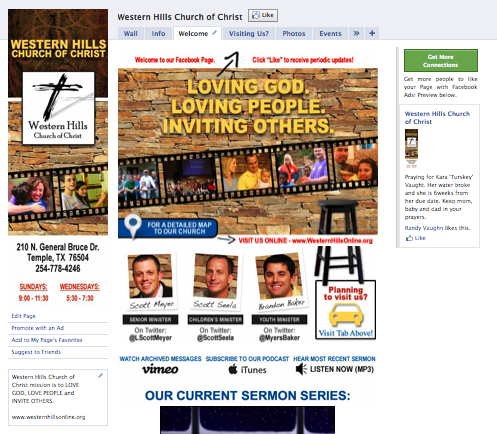
- Link your blog to your Facebook Page – importing your blog posts automatically allows the rich content of your blog to be seen by all your fans. Your visitors and subsequent Facebook fans don’t need to see a barrage of promotional events and announcements from you. Blog posts allow you to tackle relevant issues, current events and showcase more of the personality of your church and its leadership. Keystone Church in Keller, TX does this well:
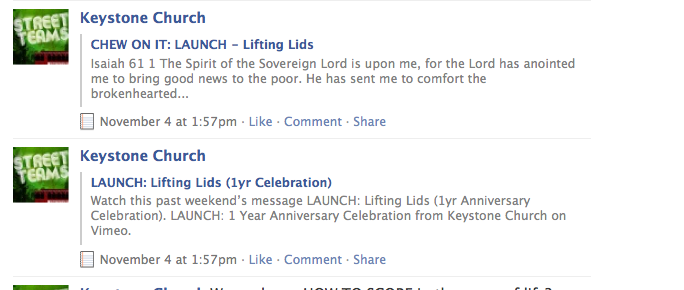
- Optimize your Christmas events on Facebook – in addition to the obvious benefit of blessing the community with spiritual messages, your church events are great “lead generators” (a marketing term that basically means you are capturing an interested audience for on-going discussion, dialogue and communication) – so don’t miss the opportunity to use your Facebook Page to get people to opt-in. They can do this by “liking” your page (Facebook opt-in) and/or signing up for an email newsletter from your church through an embedded code on your Page. Some churches are finding good success with targeted Facebook ads for events like VBS, new sermon series, and certainly Christmas events are ripe opportunities to begin conversations with your community. Create an event on Facebook – it’s super easy and promote it (using “Share” click) and encourage your church community to do the same thing on their profile – but ASK THEM to do it! And perhaps cheaper than advertising in the local paper (or in addition), consider driving attendance to this unique church event through zip-code-targeted Facebook advertising (you can use this as a test as to whether you want to continue using Facebook ads for future church events and community-enriching opportunities). Follow the folks at Henderson Hills in Edmond, OK – they are using FB events well and I’ve heard they have had good success with targeted FB advertising.
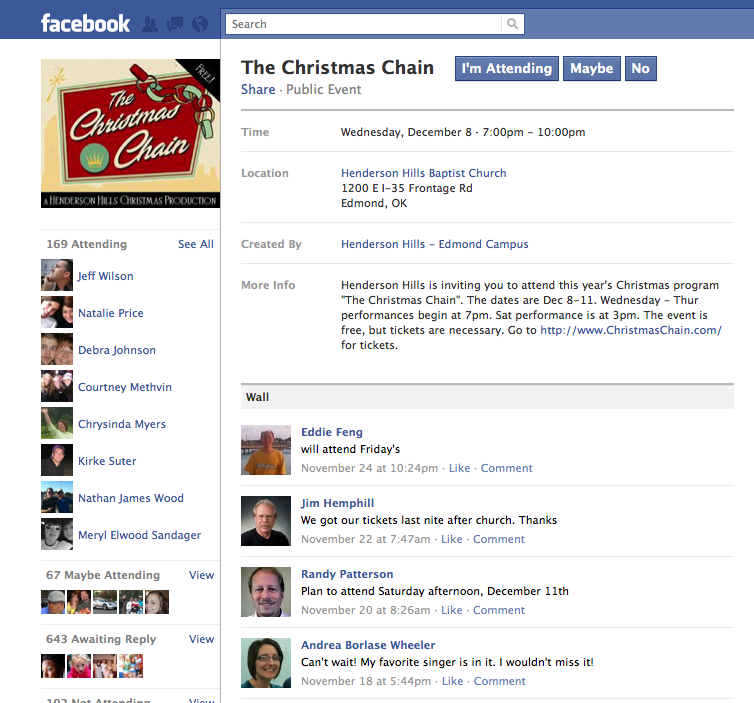
- Get your leadership on Facebook – on a personal profile side. Some may not want to do this because of time restraints or fear of getting more negative feedback (I’ve heard both of these excuses). But I think engaging people outside of the church Facebook Page is a super way to engage personally with people in your community. Link to your personal blog (and import those directly into your personal Facebook profile as “notes”, interact with you friends, make new friends in the community, comment on their profile pages, etc… It’s no secret that religious leaders have a long history with being perceived as snooty, out-of-touch, condescending, untrustworthy, hypocritical and unapproachable (hope that didn’t hurt your feelings, but it’s true from the eyes of most non-church folks). In talking about the impact of Facebook, we heard from Trey Morgan, minister at a church in Childress, TX, told us this about Facebook: “…putting sermon titles, Bible class invites, etc, has actually brought local visitors into our congregation. Facebook allows me to do ministry in the community, because I’m accessible on FB. Lurkers and seekers can look until they’re comfortable enough to step out in their curiosity. I’ve been blessed to have some really good success stories through FB, Blog, etc.”
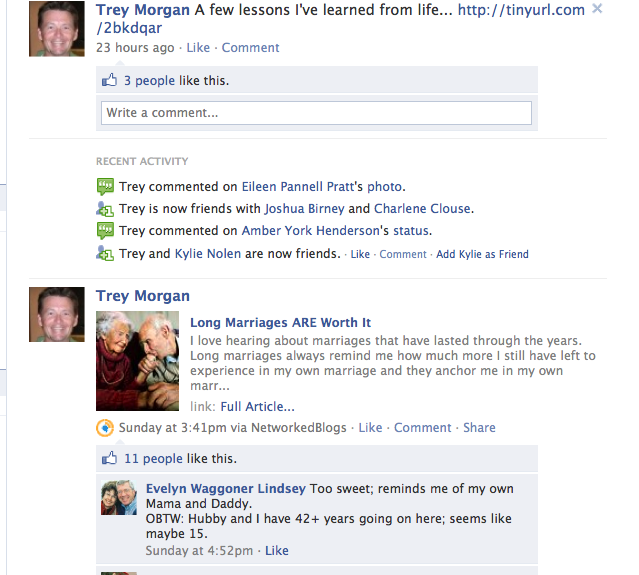
________________
BONUS ARTICLES about churches and social media:
21 Ways Your Church Can Leverage Social Media